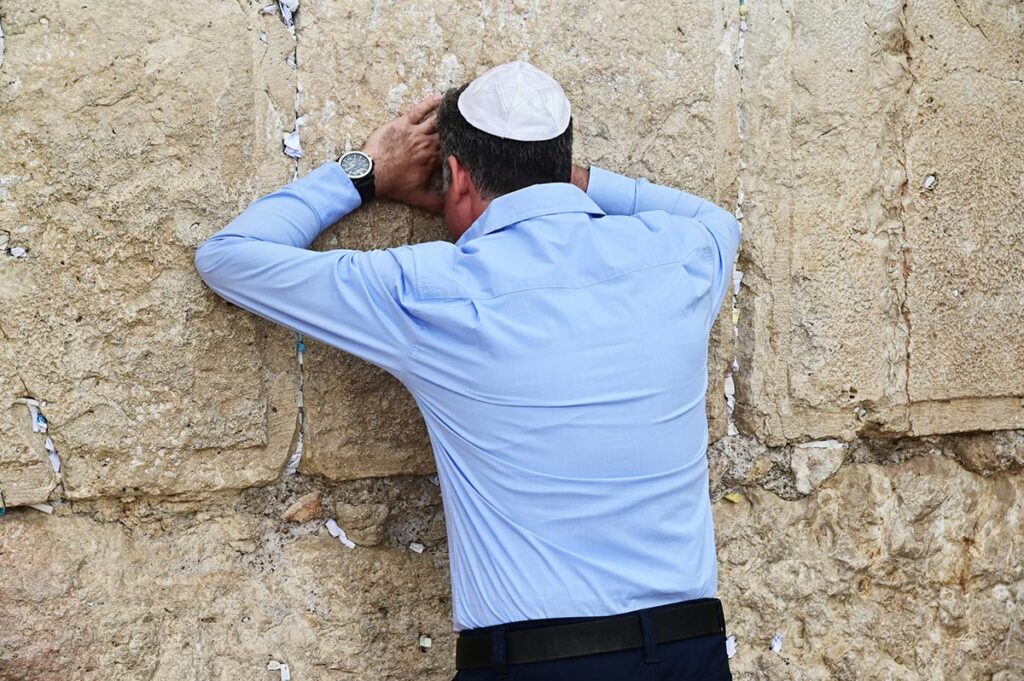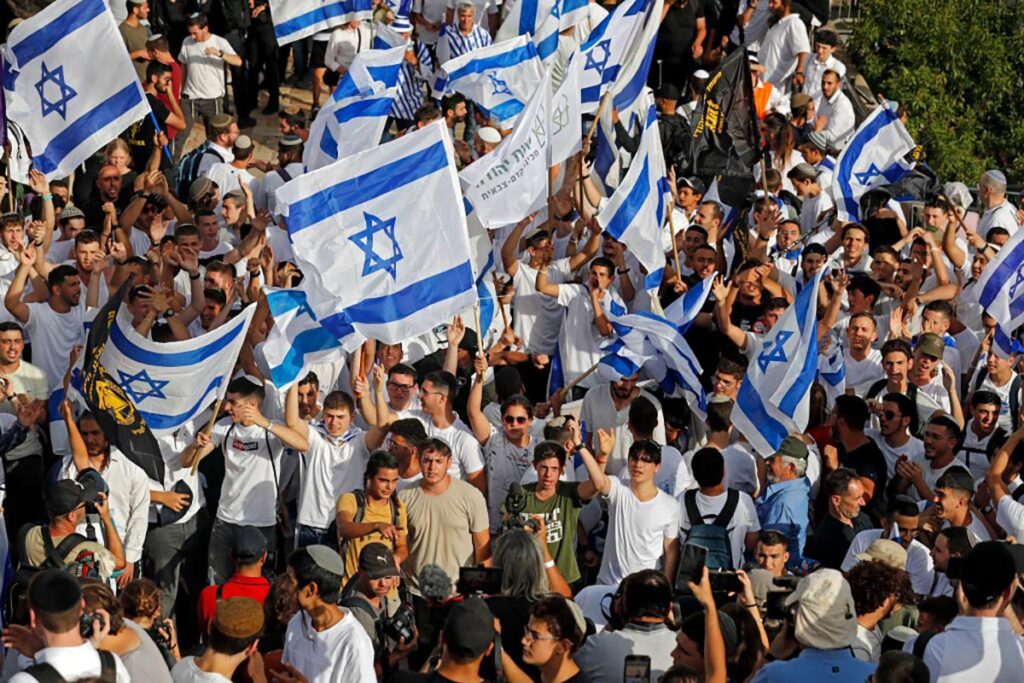We’re curious…
Jerusalem is one of the most contested places on earth. So what happens during the annual holiday celebrating that it’s under the Jewish state’s control?
Some years, there’s a peaceful parade through Jerusalem with participants singing songs like “Am Yisrael Chai” and “Jerusalem of Gold.”
But the annual Flag March on Jerusalem Day often leads to clashes between Israelis and Palestinian residents, sometimes escalating into a broader conflict.
In 2021, the tension between Israel and Hamas escalated on Jerusalem Day, sparking an 11-day war. So, why is this holiday so controversial?
How the Jewish state regained control of Jerusalem
Although Jerusalem is holy to Christians and Muslims, it is the holiest place for Jews.
It’s where ancient Jewish kings ruled, where the Holy Temples once stood, beckoning pilgrims from all over the world. And where the Jewish people directed all their prayers during 2,000 years of exile, and still pray about, three times a day.
And yet, when the Jews finally regained sovereignty and the modern state of Israel was born, their beloved city Jerusalem wasn’t included.
Can you imagine? After yearning and working to make it happen, the Jewish people had come so close to regaining all of their ancient homeland. But the Old City, Eastern Jerusalem and the West Bank remained under Jordanian control.
The area that was not under Jewish control included the Temple Mount — Judaism’s holiest place where the ancient Temples stood — and the Western Wall, the only remaining section of the Second Temple.
For the first 19 years that Israel was a state, Jews couldn’t visit their holy sites or place written prayers in the crevices.

Then came 1967 and something wild happened. Leading up to the Six-Day War, Syria and Egypt gathered near Israel’s borders, openly threatening the annihilation of the Jewish state.
The day before the war, Egyptian President Gamal Abdel Nasser declared: “The armies of Egypt, Jordan, Syria and Lebanon are poised on the borders of Israel…This act will astound the world. Today they will know that the Arabs were arranged for battle; the crucial hour has arrived.”
The mood in Israel was tense and anxious. The Arab forces on Israel’s borders greatly outnumbered the Jewish state’s military.
As they watched the armies gather and heard the fiery speeches of Arab leaders, many Israelis feared that they were on the precipice of another holocaust. And who could blame them? The Holocaust was not a history lesson, but something still fresh in the minds of many Israelis.
Yet, in six days, Israel not only pushed these armies back, but captured new territory, tripling its size practically overnight.
Israel won Sinai and Gaza from Egypt and the Golan Heights from Syria. But the most euphoric, precious victory came on day 3 when Israeli soldiers took the West Bank and East Jerusalem, including the Old City, from Jordanian control.
The pinnacle of the Six-Day War was Israeli Colonel Motta Gur’s famous declaration: “Har Habayit Biyadeinu! The Temple Mount is in our hands…The Temple Mount is ours!”
After almost 2,000 years, Jerusalem was back under Jewish control. As far as we know, a people regaining their capital like this was an unprecedented moment in world history. But Israel’s stunning victory came with lots of complications.
What is Jerusalem Day?
One year after the Six-Day War, the Israeli government declared that the 28th of Iyar would be a national holiday.
For many in Jerusalem, the day is one of joy and celebration of the liberation of Jerusalem, with thousands marching through the city waving Israeli flags.
Many observant Jews recite the festive Hallel prayer, celebrating the Jewish people’s return after a long exile, described by the ancient prophets.
But the day is also controversial, particularly from the Palestinians’ perspective, who never accepted Israel’s gains in 1967 and view this day as the Naksa, the setback.
Three months after the Six-Day War, Arab leaders declared their “Three No’s”: “No peace with Israel, no recognition of Israel, and no negotiations with Israel.”
In their eyes, Israel’s newly-acquired lands didn’t really belong to Israel. Given the deep significance of Jerusalem for Muslims, and that an Arab population had lived there for centuries, they believed it belonged to them. And Palestinian Arabs viewed Israel as wrongly “occupying” the city.
But Israelis disagreed. For them, the Jewish state had fairly won control of Jerusalem and the other territories in a defensive war. At long last, the holiest city was once again in Jewish hands.
The result? Two populations felt that Jerusalem is rightly theirs, and they still do today. Of course, many within those populations believe that the sacred city can be shared, but others disagree.
Psychologists call this “zero-sum thinking” — when one group’s win automatically becomes the other group’s loss. And zero-sum thinking doesn’t exactly inspire mutual understanding.
But what happened in the Six-Day War isn’t the only reason why Jerusalem Day is so controversial. It’s also about what happens during the celebrations.
The controversy over the annual Flag March
The annual flag march typically passes through the Muslim Quarter in the Old City. And while the majority of the marchers are peaceful, some are not.
A small but vocal minority bang on Arab storefronts, shout hateful slogans and spray paint Jewish stars on Arab houses. And Arab residents, who feel the march is a provocation, often respond in kind.

Participants insist that the march is simply meant to celebrate Israel’s victory in 1967.
“Jerusalem is the capital of Israel and anywhere that we march in the state of Israel, and particularly the capital, should not be a cause for any sort of outrage or violence,” Yehuda Liebenson, content manager at the organization Im Tirtzu, told i24 News ahead of last year’s march.
“For 19 years, there was a situation where Jews and Israelis couldn’t enter Old City whatsoever, so anywhere that the Israeli flag is displayed in the state of Israel…shouldn’t be a cause of provocation,” he added.
But other Israelis see it differently.
Yariv Oppenheimer, former director of Peace Now, said that the participants march “not because of Jerusalem, but because of the Palestinians, to try to show to the Palestinians that the Jewish people are more powerful than the Palestinians and we can wave the Israeli flag without them having the ability to wave their flag.”
Others argue something in the middle, saying that the march through the Muslim Quarter is allowed, but should be done in a decent way.
The Jerusalem Post Editorial Board wrote: “The bottom line is that while the Flag March should be a peaceful parade celebrating Jerusalem, it should not be used to undermine Israeli sovereignty or spiral out of control and spark confrontations that could spoil the joy of Jerusalem Day.”
3 takeaways: Should the Flag March be allowed?
So, should the March be allowed or not? Here are three takeaways of how we think about this:
1. If you want to show you’re bigger than someone, elevate yourself, don’t put someone else down.
There’s a great story that illustrates this: Rabbi Yisrael Salanter, a great 19th-century rabbi, once saw two boys fighting. The stronger one threw the weaker one into a ditch. When the rabbi saw this, he asked, “What in the world is going on?” The stronger one said, “We were debating which of us is taller, so I threw him into a ditch to show I was taller.”
The rabbi responded, “Why do such a thing? You could have accomplished exactly that by standing on a chair instead of throwing him into a ditch.”
2. It is not that Jerusalem is part of the Jewish people — it is core to the Jewish people.
Did you know that Jerusalem is mentioned over 600 times in the Tanakh, the Hebrew Bible? It’s where some of the most important Biblical events took place — Abraham’s near-sacrificing of Isaac, King David’s conquest of the city, and the construction of the First and Second Temples.
Jerusalem is a city we mention every time we thank God after eating a meal. It’s a city that we fast to commemorate, most notably on the 9th of Av, when we mourn the loss of the Temple and the destruction of Jerusalem from 2,000 years ago.
It’s a city that has inspired Jewish artists and poets, like Rabbi Yehuda Halevi, Naomi Shemer and Meir Ariel.
3. How should people show their Jewish pride?
The march is an opportunity to either celebrate Jewish pride, or to utilize Jewish pride to hurt somebody else.
Jerusalem Day is a day that can be patriotic and celebratory and a day of gratitude — in a positive way — but it’s also a day that can be butchered and misappropriated, utilized to hurt the people who lost this war. That is no way to celebrate.
So, yes, Jerusalem Day is controversial and yes, Jerusalem Day is a profound opportunity to celebrate a return to Jewish sovereignty. But most importantly, it is an opportunity to do a kiddush Hashem, to sanctify God’s name. Rabbi Jonathan Sacks said:
“When people associate religiosity with integrity, decency, humility, and compassion, God’s name is sanctified. When they come to associate it with contempt for others and for the law, the result is a desecration of God’s name.”
Jerusalem Day should be a day of sanctifying God’s name…let’s go for it.
